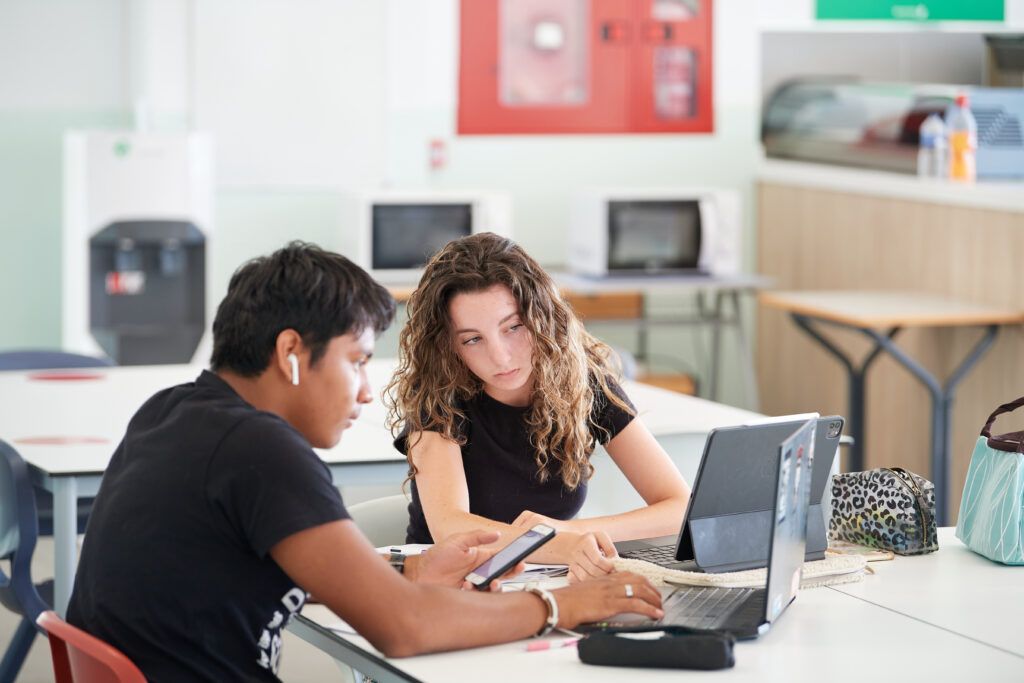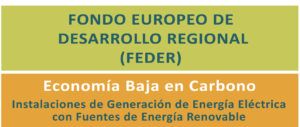Welcome to Sixth Form
Sixth Form, a passport to an international future
Sixth form (Y12 & Y13) are the final two years of school, corresponding to the Spanish Baccalaureate. At LES we follow A Levels (Advanced Level qualifications), a British subject-based qualification for students 16 and up. They are taken over two years, and offer recognised qualifications for entry to higher education in the UK and many other countries around the world. Students wishing to improve their entry grades for Spanish universities are strongly advised to take additional PCE subjects.
What is the Sixth Form methodology like?
There are specific entry recommendations for each subject. A level Mathematics or PCE Pure Mathematics, for example, are not recommended for students who do not have at least a grade 7 at (I)GCSE. In other words, a solid foundation is needed to take the next steps and this is the case for all A level subjects.
For timetable purposes, subjects are organized into blocks. All subjects in a block are taught at the same time, so it is impossible to take more than one subject from the same block. The block time table for the academic year can be consulted with the Sixth Form team.
Sixth form, individual attention and maximum performance
During the final years of secondary school we work with students to help them decide on their future path. Each individual has a personalised program that takes them to the next phase in their education. With excellent academic qualifications they can access universities across the globe or take another path, such as an apprenticeship, towards obtaining a degree or professional qualification.
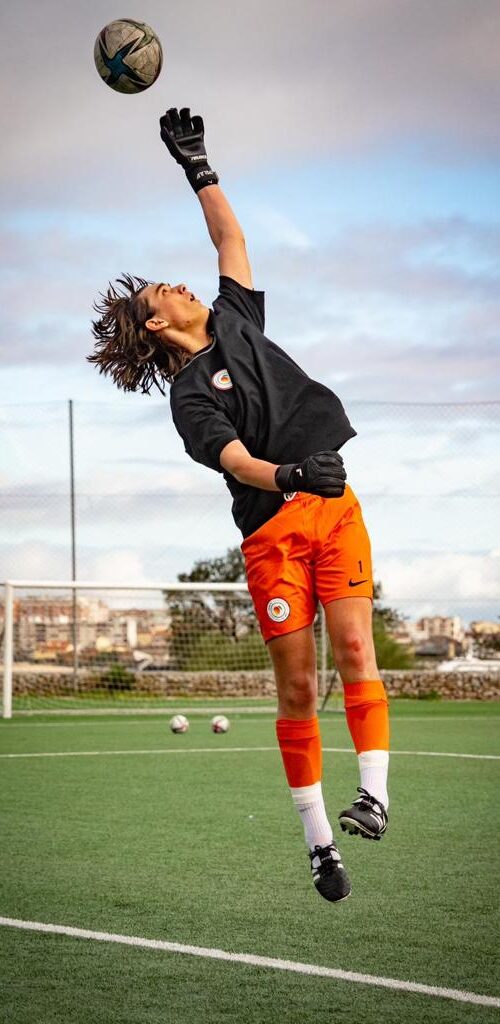
Lady Elizabeth School: over 20 specialised A level subjects!
We offer a wide range of over twenty specialized courses designed to meet the needs of students and their future aspirations. Our aim is to ensure that students choose the right program so that in A Level examinations they achieve the grades they need for the future, and thus gain access to the university studies they want.
At the end of Year 13, students sit the internationally recognised A Level examinations and the A Levels they need for university entrance. The school then validates their A Levels. With this personalised program of studies, our students can gain access to Spanish or international universities.
Sixth-year subjects
- ART
- BIOLOGY
- BUSINESS STUDIES
- CHEMISTRY
- Computer Science
- DRAMA AND THEATRE
- ECONOMICS
- ENGLISH LANGUAGE
- ENGLISH LITERATURE
- ENGLISH AS AN ADDITIONAL LANGUAGE (EAU)
- GEOGRAPHY
- GRAPHIC COMMUNICATION
- HISTORY
- MATHEMATICS AND ADVANCED MATHEMATICS
- MARINE SCIENCE
- MODERN FOREIGN LANGUAGES: SPANISH, FRENCH AND GERMAN
- MUSIC
- PHYSICS
- PHYSICAL EDUCATION (PE)
- RUSSIAN
- PHOTOGRAPHY
- TRAVEL AND TOURISM
- PSYCHOLOGY
Most of the work in this curriculum is practical or studio work, so that pupils can develop their skills of observation and analysis of the visual world, sensitivity, dexterity, self-expression, and imagination. Visit our brochure for more information
Biology A level builds on the knowledge, understanding and practical skills acquired at IGCSE Biology. Therefore, students must already have a minimum of grade 6 in their IGCSE in order to continue with this subject at A level. Visit our brochure for more information
Although it would be an advantage to have prior knowledge of Business Studies at GCSE level, it is not a prerequisite for studying A level. However, students need a good level of English and Mathematics for both comprehension and communication in order to analyse business problems and find solutions, at least a grade 4 in each, or equivalent.Visit our brochure for more information
Students are expected to have at least the equivalent of an IGCSE grade 6 in Chemistry and a minimum of grade 5 in Mathematics. Chemistry students should be able to communicate effectively, research, work independently and think critically to solve problems. Good practical skills are also important. Visit our brochure for more information
Ideal for students who have good logic and analytical skills, usually good in Mathematics, at least a grade 6 at GCSE. Visit our brochure for more information
Will engage students by encouraging creativity, focusing on practical work that reflects 21st century theatre practice and developing skills that will support progression to further study in drama and a wide range of other subjects. Visit our brochure for more information
It is divided into two parts: Microeconomics and Macroeconomics. No prior knowledge of Economics is required to take A level. Visit our brochure for more information
For students of first language GCSE grade B or above, or the equivalent, in English. Visit our brochure for more information
A grade C or above in both English Language and Literature at GCSE, or equivalent, would be the recommended basis for studying English Literature at A level. Visit our brochure for more information
EAL teachers aim not only to support second language learners in their A-level work, but also to help them gain further qualifications in English Language. These will be needed to gain access to universities in the future and to obtain student visas in some countries. Visit our brochure for more information
A broad based academic subject which will open up options for your future. Employers and universities see geography as a robust academic subject rich in skills, knowledge and understanding. There are no prerequisites however you must have a reasonable pass in GCSE English. Visit our brochure for more information
It is an exciting medium that is used in many different ways to communicate a visual message through design and text. Syllabus: GCE Art and Design: Graphic Communication 9GC0 – www.qualifications.pearson.com Visit our brochure for more information
This A Level International course builds on the knowledge gained at IGCSE History (or equivalent). Syllabus: IAL History YHI01 12 – www.qualifications.pearson.com Visit our brochure for more information
Both are available at AS and A2 levels. To study Mathematics at Advanced level, it is recommended to have obtained a 7 or above at IGCSE or equivalent. Syllabus: IAL Mathematics YMA01 23 – www.qualifications.pearson.com Visit our brochure for more information
An introduction to marine science, for marine and environmental enthusiasts. Syllabus: GCE Marine Science 9693 – www.cambridgeinternational.org Visit our brochure for more information
Spanish, French and German. AS and A level qualifications are a natural progression from IGCSE and therefore students should have a good level of competence before starting the AS/A level course in any foreign language. Syllabus: IAL Spanish YSP01 10 | IAL French YFR01 8 | IAL German YGN01 12 – www.qualifications.pearson.com Visit our brochure for more information
This A level will be available from September 2023. Visit our brochure for more information
A grade 6 at IGCSE Physics with a grade 5 in Mathematics would be the recommended for entry to the Physics A level course. Students will build on the knowledge, understanding and processing skills developed at IGCSE. Syllabus: IAL Physics XPH11 – www.qualifications.pearson.com Visit our brochure for more information
It is advisable but not essential to have studied Physical Education at GCSE level. Students must be participating in at least one sporting activity at a good level and must be willing to dedicate time to enhancing performance or coaching outside the curriculum. Students must have a competent level of written English. Syllabus: Edexcel GCE Physical Education 9PE0 4 – www.qualifications.pearson.com Visit our brochure for more information
For first language students this A level can be completed in one year. Syllabus: GCE Russian 9RU0 – ww.qualifications.pearson.com Visit our brochure for more information
Designed to provide progression to further study for students who have studied GCSE Photography. Visit our brochure for more information.
Travel and Tourism A Level is ideal for those who wish to specialise in this subject. The course of study is designed so that it can be undertaken by candidates entering the area for the first time. Syllabus: CIE Travel and Tourism 9395 16 Visit our brochure for more information
An opportunity for our students to deepen their understanding of human behaviour. Variety of topics, such as social, cognitive and criminological psychology. No previous qualification in psychology needed, however, a good grasp of maths and science is recommended. Level 6 in English, Maths and Science (if studied at GCSE). Syllabus: AS/A2 Psychology – www.qualifications.pearson.com Visit our brochure for more information
What are the specific competency tests (PCE)?
The PCE tests are recommended for students who wish to improve their university entrance marks. They are exams conducted by UNED asiss in order to assess students’ competence in specific subjects and at LES we offer individual and group guidance so that students know the pathway to follow and the plan to develop. At LES we offer a wide range of PCE subjects to suit different career paths.
A levels are very demanding academic curriculum. We recommend that students only consider them if they have a strong (I)GCSE background. A Year 11 student who struggles to achieve 5 (I)GCSEs will struggle to pass A levels. Therefore, we have a recommended entry requirement for Sixth Form of 5 (I)GCSEs, School Leaving Certificate, Attestat (10 years) or equivalent. It is also important that students have a good command of English, a minimum of B2 level. Learn more here: THE SIXTH FORM BROCHURE 2023
Most universities require a minimum of 3 A level subjects for entry. Subjects and grades can vary greatly depending on the country and the university to which the student is applying. Therefore, it is very important to do your research before starting the penultimate year (Y12).
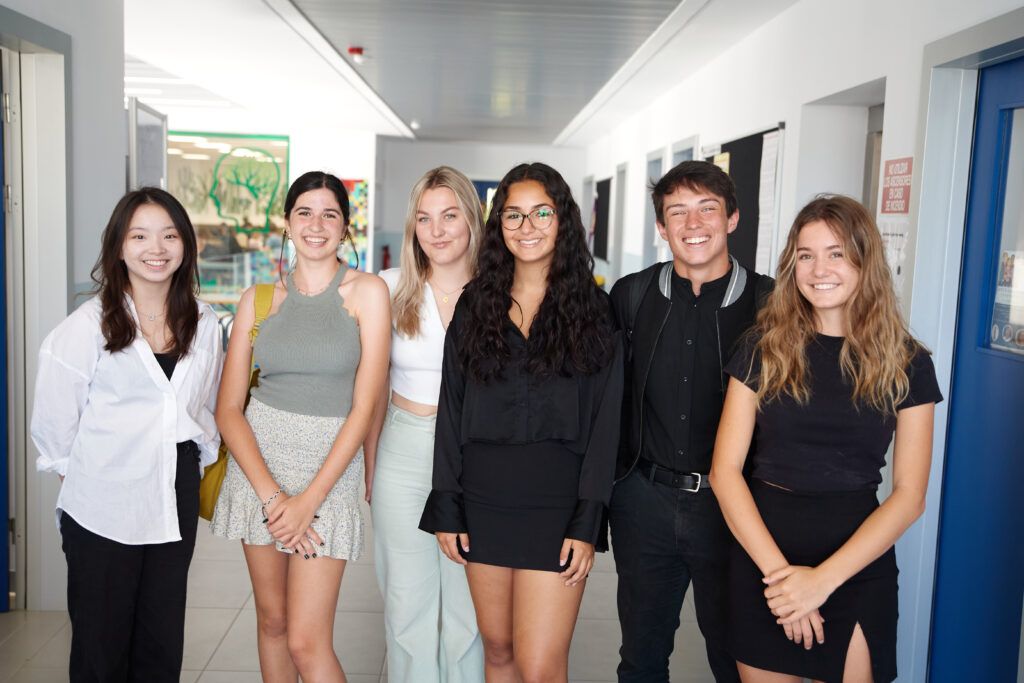
How many PCE subjects should I take?
- Alumnos de Y12: Y12 students: 2 PCE subjects plus English as an Additional Language (EAL).
- Alumnos de Y13: Y13 students: 3 PCE subjects plus English as an Additional Language (EAL).
What PCE subjects are offered in LES?
- Biology
- Technical Drawing
- Graphic Design
- Business Economics
- Physics
- Fundamentals of Art:
- Geography
- History of Art
- Pure mathematics
- Applied Mathematics
- Chemistry
University & Careers
University & Careers
When students are considering their career options, they need accurate, comprehensive information. The Careers Department at Lady Elizabeth School provides orientation thanks to our Future Pathways Programme which includes:
- Unifrog Platform, a one-stop-shop where students can easily explore their interests with personalised profiles, to then find and successfully apply for their next best step after school. Unifrog will help you to explore your key interests and what career paths you can take to reach your goals! A complete destinations platform for students across KS3, KS4 and KS5 regardless of their interests or academic ability.
- Careers Fair: two on campus annual fairs – Spanish Uni Fair in November and SRT International Uni Fair in March with over 30 university stands each, offer a wonderful opportunity for students to gain an insight into career and university choices which direct face to face meetings with University representatives. sting and inspiring.
-
Workshops and Activities:
-
- Careers interviews to give the student advice and help when trying to decide on future career choices.
- Skills workshops to increase the knowledge and intellectual development of the student, covering topics such as: presentation skills, interview techniques, problem solving, teamwork, communication skills or time management.
- The Mentoring Programme for Year 7 students.
-
- Work Observation Week provides an opportunity for Year 10 students to spend some time in a business, so that they can relate their school curriculum and qualifications to the skills and qualities that are required in the workplace. Students find either locally based work in a field of their interest or they travel further afield to other areas in Spain or throughout Europe and the UK. It is an invaluable experience and can help students to decide whether they will or won’t pursue a particular career.
Sixth Form Life
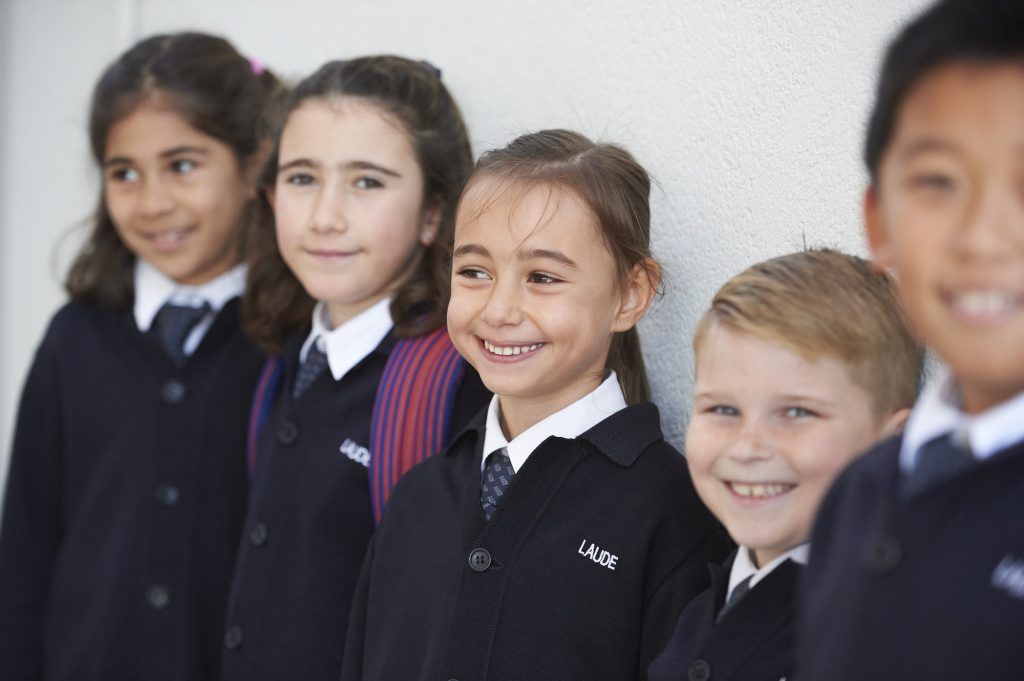
The Sixth Form mentoring program involves organising activities and tutoring sessions with the Year 7s and the Year 8s. We try to incorporate the Value of the Month into our weekly mentoring lessons as a basis for the activities.
For any new pupil, the transition into a new school with new people can be a little daunting, therefore mentors try to give any guidance and advice to help them adjust and feel like a part of our school community.
Whether it is a ‘high five’ in the corridor or help with their problems, mentoring is a fantastic opportunity for both the mentors and the mentees to bond!
Our Sixth Form students assist with several charity events during the year. They help staff and motivate younger pupils to participate. They organize and supervise stalls at the Christmas Fayre and are always keen to dress-up to help create a great atmosphere. House Captains come up with new fundraising ideas and discuss which charities to give to. Student participation in such events helps with team-building, organizational, and communication skills, which in turn produces young independent adults ready for future studies and employment.

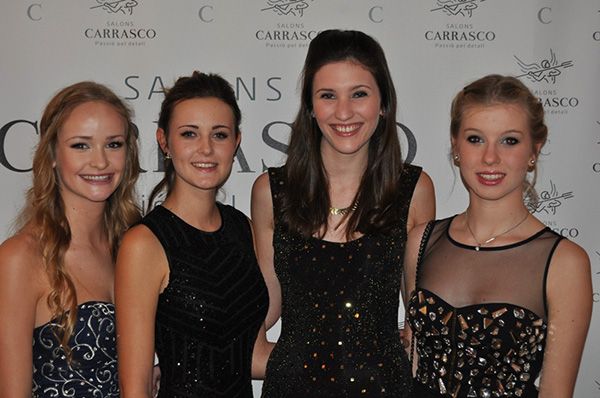
The Sixth Form Christmas Ball has become an annual event organized by the Head Pupils, and a fabulous way to end the term. It gives 6th formers the chance to relax for the night and momentarily forget the looming examination period and all the pressures of their A Levels. The standard of dress is superb, with every student going to great lengths to make the night memorable. Prizes are awarded for the Best Dressed Girl and Boy and the Queen and King of the ball.
